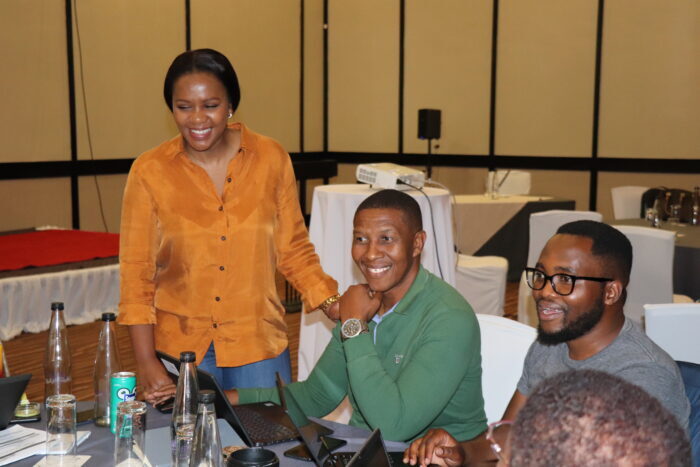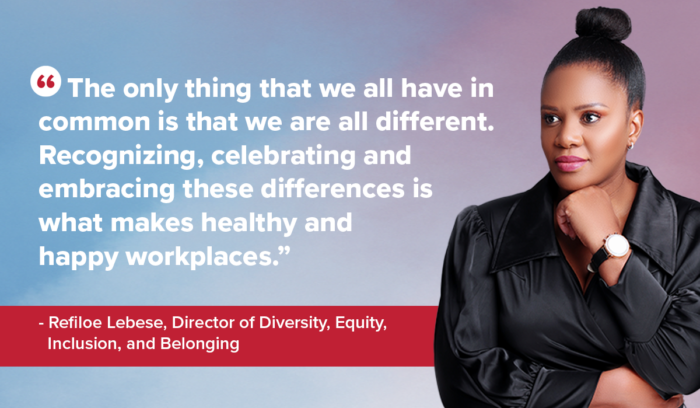In recent years, many organizations have begun to re-examine their policies, approaches, and culture when it comes to persistent systemic inequities. This includes the Elizabeth Glaser Pediatric AIDS Foundation (EGPAF), which was founded in 1988 in the United States—headquartered first in Los Angeles and, later, in Washington, D.C.
During its first decade, EGPAF focused on research and policies to end AIDS in children, youth, and families in the United States. But over the past 22 years, EGPAF’s work has shifted to primarily work in African nations—with those programs being led and implemented by technical experts in those countries. This change in the geographic focus of our work has also impacted the EGPAF workforce, and we are now a complex global workspace in terms of diversity, equity, and inclusion.

To better understand and address these issues, EGPAF hired Refiloe Lebese in 2022 to direct the organization’s Diversity, Equity, Inclusion, and Belonging (DEIB) initiative. Refiloe is an international human resources expert, based out of South Africa, with more than 20 years of experience managing and supporting staff across North America, Africa, and Europe.
We sat down with her to better understand how international organizations like EGPAF can engage with diversity, equity, inclusion—and belonging. This is a two-part series.
Could you explain the four different elements of DEIB: diversity, equity, inclusion, and belonging?
I would say that diversity describes what makes us unique as individuals—the differences in race, ethnicity, tribe, geography, and socioeconomic position. That also includes people’s backgrounds, religious beliefs, sexual orientation, heritage—our life experiences, including our academic and professional backgrounds. Where are you in the world?
Really, it is all these things that make us who we are. Diversity allows for the exploration of these differences in a safe, positive, and nurturing environment.
The question I always ask when I’m doing my training in the African countries where EGPAF works is “What is the only thing we all have in common?” And the participants would say, “We are all Black.” Then, I say, “Yes, but then there are so many other layers to us outside of being Black. There are so many other distinct qualities that make you unique.”
The only thing that we all have in common is that we are all different. Recognizing, celebrating and embracing these differences is what makes healthy and happy workplaces.
When I talk of equity, it’s recognizing that every individual has different needs based on their circumstances. Equity includes understanding and providing support and assistance and opportunities to reach an equal outcome. Equity, to me, is recognizing that there are systematic barriers that have existed as well as ways to eliminate these barriers and overcome inequality opportunities. With equity, the goal is to ensure that people are treated fairly.
Now, when it comes to inclusion, it’s basically taking equity and putting it into action. Because it’s one thing to have all these diverse, great human beings in an organization—but do they feel included?
Let me make an example with South Africa. When we came into democracy, the government said, “We need to correct the wrongs of the past.” Affirmative action policy was introduced to address issues of inequality by ensuring that qualified people from marginalized groups had equal opportunities to employment. Some organizations recruited extensively in alignment with the affirmative action policy. However, there was a lot of tokenism, where senior positions were just filled with bodies to tick boxes—but if one looked closely, those individuals did not have the same level of responsibility or decision making as their white counterparts.
That was not inclusion. It was just addressing the diversity part: “Let’s be diverse, but we are not going to include you.”
There’s really no point of having all this diversity and not ensuring that people are included—because there’s richness and ideas to be shared once we come together. I’ve got a lot to share; another person has got a lot of great ideas. So bringing all of that together and really hearing everybody is inclusion. I think that for any organization to be successful, inclusion plays an integral part.
And then belonging. This is one of the newer concepts because for many years we talked of DEI, and we ended there. Belonging has to start with inclusion. You can’t belong if you’re not included, right? So it’s really just a sense that your uniqueness is accepted and even treasured within that organization. You believe that. You feel that your accumulated day-to-day experiences enable you to feel safe, that you can bring your full self and authentic self to work: “I belong here.”
People feel engaged in a work environment that encourages their uniqueness. You are part of the team. You are an insider. You feel highly valued.

How does DEIB relate to the history and mission of EGPAF?
Our goal as an organization remains ending AIDS in children, women, and families.
Elizabeth Glaser embarked on this journey with her friends and wanting to end inequality for children living with HIV. Elizabeth fought for research and treatment for children in the United States when they were being left out—and she was wildly successful at securing the funding and the policies there. After she, herself, died from AIDS-related causes, the organization looked beyond the United States to children around the world, who continue to lag other populations when it comes to HIV research and services.
So one of our core values is definitely equity. For me, our current DEIB strategy is just an extension of what we started many years ago. We are taking it to the next level. We need to be guided by DEIB principles in everything that we do.
More than a year ago, EGPAF leadership came up with our global DEIB strategy with core pillars. We wanted to focus on the recruitment and hiring plan, looking at how diverse we are in our recruitment. We are approaching this very thoughtfully. We are intentional in how we bring and develop talent in the organization. We are being intentional as well with our succession planning and retention strategies, that these are DEIB-sensitive. This means identifying and developing staff to fill critical positions that may become open.
One of the key areas that we identified was that we really don’t include enough people from some marginalized communities—for instance, people with disabilities. There’s a big focus on that this year as part of our 2023 priorities: How do we ensure that we are attracting talent from marginalized communities—recognizing that what is marginalized in one country might not be considered marginalized in another.
Some of this work will take time, but there are certainly areas that have quick tangible action plans. What does accessibility look like if I am to bring in someone who’s on a wheelchair into an office where there are only stairs; there’s no lift/elevator. We are really being intentional in advancing those areas where we can make meaningful changes.
One other area that we are working on is our communications. How do we ensure that we are inclusive in how we communicate internally? We sent out a survey for our external communications asking for input on how we portray the communities that we work with. What terminologies are we using?
We have an Internal Communications Committee that ensures that we continue to promote transparent, consistent, and accessible communication. We are translating materials to make sure that it reaches all employees at EGPAF. And we have developed a training plan to continue to build awareness around DEIB issues.
We are working very hard towards instilling a sense of belonging at EGPAF through employee surveys where we are always asking “Do you feel like you belong here? Do you feel like you belong to your team?” And those are key things that we want to address, and if they are gap areas, how do we work on those to ensure that everybody truly feels part of the organization.
We aim to develop and make space for individuals to have courageous conversations—because some of DEIB work is not easy, right? Some of the conversations can be emotional as we all have our own personal journeys. We have to create healthy and safe workplaces where each EGPAF staff member feels comfortable sharing their authentic self.
EGPAF’s leadership team has been critically assessing how we do business as an organization, interrogating and analyzing some of the responsibilities and shifting decision-making to countries. At every level of the organization, we have seen a commitment to ensure there is honest, authentic conversations and meaningful change.
This work is not always easy, but this dedication will make us successful and create sustainable change.

This is part one of a two-part discussion of DEIB in the international NGO context.




